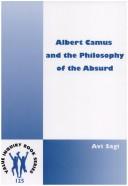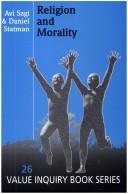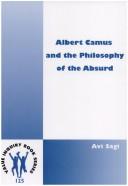| Listing 1 - 10 of 16 | << page >> |
Sort by
|
Book
ISBN: 3319991787 3319991779 Year: 2018 Publisher: Cham : Springer International Publishing : Imprint: Springer,
Abstract | Keywords | Export | Availability | Bookmark
 Loading...
Loading...Choose an application
- Reference Manager
- EndNote
- RefWorks (Direct export to RefWorks)
The book grapples with one of the most difficult questions confronting the contemporary world: the problem of the other, which includes ethical, political, and metaphysical aspects. A widespread approach in the history of the discourse on the other, systematically formulated by Emmanuel Levinas and his followers, has invested this term with an almost mythical quality—the other is everybody else but never a specific person, an abstraction of historical human existence. This book offers an alternative view, turning the other into a real being, through a carefully described process involving two dimensions referred to as the ethic of loyalty to the visible and the ethic of inner retreat. Tracing the course of this process in life and in literature, the book presents a broad and lucid picture intriguing to philosophers and also accessible to readers concerned with questions touching on the meaning of life, ethics, and politics, and particularly relevant to the burning issues surrounding attitudes to immigrants as others and to the relationship with God, the ultimate other. .
Phenomenology . --- Social justice. --- Judaism-Doctrines. --- Existential psychology. --- Existentialism. --- Phenomenology. --- Social Justice, Equality and Human Rights. --- Jewish Theology. --- Existential approach. --- Existenzphilosophie --- Ontology --- Phenomenology --- Philosophy, Modern --- Epiphanism --- Relationism --- Self --- Psychology, Existential --- Existentialism --- Phenomenological psychology --- Psychoanalysis --- Equality --- Justice --- Human rights. --- Judaism—Doctrines. --- Basic rights --- Civil rights (International law) --- Human rights --- Rights, Human --- Rights of man --- Human security --- Transitional justice --- Truth commissions --- Law and legislation --- Judaism --- Clinical psychology. --- Philosophy of mind. --- Self. --- Human Rights. --- Clinical Psychology. --- Philosophy of the Self. --- Personal identity --- Consciousness --- Individuality --- Mind and body --- Personality --- Thought and thinking --- Will --- Mind, Philosophy of --- Mind, Theory of --- Theory of mind --- Philosophy --- Cognitive science --- Metaphysics --- Philosophical anthropology --- Psychiatry --- Psychology, Applied --- Psychological tests --- Jewish theology --- Theology, Jewish --- Doctrines.
Multi
ISBN: 9783319991788 9783319991771 Year: 2018 Publisher: Cham Springer
Abstract | Keywords | Export | Availability | Bookmark
 Loading...
Loading...Choose an application
- Reference Manager
- EndNote
- RefWorks (Direct export to RefWorks)
The book grapples with one of the most difficult questions confronting the contemporary world: the problem of the other, which includes ethical, political, and metaphysical aspects. A widespread approach in the history of the discourse on the other, systematically formulated by Emmanuel Levinas and his followers, has invested this term with an almost mythical quality—the other is everybody else but never a specific person, an abstraction of historical human existence. This book offers an alternative view, turning the other into a real being, through a carefully described process involving two dimensions referred to as the ethic of loyalty to the visible and the ethic of inner retreat. Tracing the course of this process in life and in literature, the book presents a broad and lucid picture intriguing to philosophers and also accessible to readers concerned with questions touching on the meaning of life, ethics, and politics, and particularly relevant to the burning issues surrounding attitudes to immigrants as others and to the relationship with God, the ultimate other. .
Philosophical anthropology --- General ethics --- Jewish religion --- Sociology --- Human rights --- mensenrechten --- sociologie --- filosofie --- Jodendom --- existentialisme
Digital
ISBN: 9783030822422 9783030822439 9783030822446 9783030822415 Year: 2021 Publisher: Cham Palgrave Macmillan
Abstract | Keywords | Export | Availability | Bookmark
 Loading...
Loading...Choose an application
- Reference Manager
- EndNote
- RefWorks (Direct export to RefWorks)
The relationship between morality and religion has long been controversial, familiar in its formulation as Euthyphro's dilemma: Is an act right because God commanded it or did God command it because it is right. In Morality and Religion: The Jewish Story, renowned scholar Avi Sagi marshals the breadth of philosophical and hermeneutical tools to examine this relationship in Judaism from two perspectives. The first considers whether Judaism adopted a thesis widespread in other monotheistic religions known as 'divine command morality,' making morality contingent on God's command. The second deals with the ways Jewish tradition grapples with conflicts between religious and moral obligations. After examining a broad spectrum of Jewish sources-including Talmudic literature, Halakhah, Aggadah, Jewish philosophy, and liturgy-Sagi concludes that mainstream Jewish tradition consistently refrains from attempts to endorse divine command morality or resolve conflicts by invoking a divine command. Rather, the central strand in Judaism perceives God and humans as inhabiting the same moral community and bound by the same moral obligations. When conflicts emerge between moral and religious instructions, Jewish tradition interprets religious norms so that they ultimately pass the moral test. This mainstream voice is anchored in the meaning of Jewish law, which is founded on human autonomy and rationality, and in the relationship with God that is assumed in this tradition. .
General ethics --- Jewish religion --- ethiek

ISBN: 9789004493452 9789042012301 Year: 2002 Publisher: Leiden;Boston BRILL
Abstract | Keywords | Export | Availability | Bookmark
 Loading...
Loading...Choose an application
- Reference Manager
- EndNote
- RefWorks (Direct export to RefWorks)
This book is an attempt to read the totality of Camus's oeuvre as a voyage, in which Camus approaches the fundamental questions of human existence: What is the meaning of life? Can ultimate values be grounded without metaphysical presuppositions? Can the pain of the other penetrate the thick shield of human narcissism and self-interest? Solipsism and solidarity are among the destinations Camus reaches in the course of this journey. This book is a new reading of one of the towering humanists of the twentieth century, and sheds new light on his spiritual world.

ISBN: 9789004493964 9789042014121 Year: 2000 Publisher: Leiden;Boston BRILL
Abstract | Keywords | Export | Availability | Bookmark
 Loading...
Loading...Choose an application
- Reference Manager
- EndNote
- RefWorks (Direct export to RefWorks)
This book is an original philosophic exploration of the meaning of Kierkegaard's life, his thought, and his works. It makes a bold case for Kierkegaard's recognition of the concrete existence of the individual, including Kierkegaard himself, as crucial to the spiritual life. Written with delicate insight, and beautifully translated from Hebrew, this work offers valuable new turns to understanding the puzzling life-work of a modern giant of spiritual reflection.
Religion --- Self (Philosophy) --- Philosophy
Digital
ISBN: 9781618115041 9781618115034 Year: 2016 Publisher: Boston, Mass. Academic Studies Press
Abstract | Keywords | Export | Availability | Bookmark
 Loading...
Loading...Choose an application
- Reference Manager
- EndNote
- RefWorks (Direct export to RefWorks)
Multi
ISBN: 9781618115355 9781618115348 Year: 2016 Publisher: Boston, Mass. Academic Studies Press
Abstract | Keywords | Export | Availability | Bookmark
 Loading...
Loading...Choose an application
- Reference Manager
- EndNote
- RefWorks (Direct export to RefWorks)

ISBN: 9789004463868 9789051838381 Year: 1995 Publisher: Leiden;Boston BRILL
Abstract | Keywords | Export | Availability | Bookmark
 Loading...
Loading...Choose an application
- Reference Manager
- EndNote
- RefWorks (Direct export to RefWorks)
Religion and Morality seeks to answer two fundamental questions regarding the relation between religion and morality. The first is the puzzle posed by Socrates, the so-called ' Euthyphro dilemma', which asks: is morality valuable by virtue of its intrinsic importance and worth, or is morality valuable because, and only because, God approves it and commands us to follow its dictates? The second question is raised by Kierkegaard in Fear and Trembling . He asks: Is a conflict between religion and morality possible? Does God ever demand that we neglect our moral commitments? The discussion on these questions is divided into three parts. In the first two parts, we discuss the idea that morality depends on religion. The authors distinguish two types of dependence: strong dependence, according to which the very existence, or validity, of moral obligations depends on God's command, and weak dependence, according to which though morality itself is independent of God, God (or belief in God) is necessary to enable human beings to know their moral duties and to carry them out. The authors reject the strong dependence thesis, as well as most versions of the weak dependence. The third part of the book discusses different versions of the view that religion might conflict with morality. The authors reject this view, and show that very few religious thinkers would follow it all the way through to its ultimate consequences. The book has implications for the philosophy of religion, in its emphasis on the centrality of the moral element in religion, and for moral philosophy, in its highlighting, among other things, of the nature of moral judgments.
Ethics --- Morality --- Philosophy --- Religion

ISBN: 9042012307 900449345X Year: 2002 Publisher: Amsterdam New York Rodopi
Abstract | Keywords | Export | Availability | Bookmark
 Loading...
Loading...Choose an application
- Reference Manager
- EndNote
- RefWorks (Direct export to RefWorks)
Multi
ISBN: 9781618114532 9781618114525 Year: 2015 Publisher: Boston, Mass. Academic Studies Press
Abstract | Keywords | Export | Availability | Bookmark
 Loading...
Loading...Choose an application
- Reference Manager
- EndNote
- RefWorks (Direct export to RefWorks)
| Listing 1 - 10 of 16 | << page >> |
Sort by
|

 Search
Search Feedback
Feedback About UniCat
About UniCat  Help
Help News
News